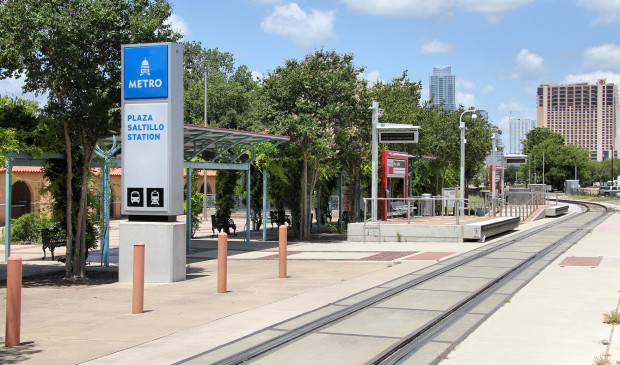Plaza Saltillo agreement falls short of labor advocates’ approval
Tuesday, March 22, 2016 by
Caleb Pritchard The Capital Metro Transportation Authority’s board of directors on Monday approved the terms of its partnership with private developers to bring a massive urban infill project to the eastern gate of downtown Austin.
At its monthly meeting, the board voted 7-0 on the master agreement between Capital Metro and Endeavor Real Estate Group to redevelop the 10-acre Plaza Saltillo tract along East Fifth Street just east of I-35.
Despite the one-sided nature of the vote, controversy is still swirling around the final terms of the agreement, which a labor advocate afterward said gave him “grave concerns.”
“We hope that, moving forward, Capital Metro will reconsider the precarious position that they have put many workers in,” Bo Delp of the Workers Defense Project told the Austin Monitor after the vote. “Right now there are many construction workers on this project that will be denied safety training. There are many construction workers on this project that will be denied worker’s compensation.”
WDP had rallied on Thursday at a board work session to urge the directors to force Endeavor to adopt standards in line with WDP’s Better Builder program. On Friday, the Travis County Democratic Party endorsed that position with a resolution passed at its annual convention. Better Builder standards include a living wage, mandatory Occupational Safety and Health Administration training for every worker on a project, local hiring minimums, worker’s compensation insurance and independent on-site monitoring of working conditions.
Endeavor’s proposal on Thursday included a minimum wage for workers of $11.39 an hour, some OSHA training, a mix of worker’s compensation and alternative policies, and independent monitoring that would be contracted by Endeavor itself.
During public comments before the vote, WDP Executive Director Jose Garza told the board that one construction worker dies in Texas every three days. Many others are injured on the job, and a third report wage theft.
“If the developer monitoring themselves was the solution, the facts that I’ve just walked through about the construction industry in the state of Texas would not exist,” Garza concluded.
Before the vote, the board went into executive session to discuss the terms. When the members re-emerged some 45 minutes later, changes in the terms were revealed.
Rick Reed, a private lawyer working on the deal on Cap Metro’s behalf, said that Endeavor had agreed to pay a minimum wage of $13.03 an hour. As for on-site monitoring, Cap Metro officials would have veto power over Endeavor’s selection, and the contractor chosen will submit reports to both the transit agency and the developer.
Cap Metro spokeswoman Amy Peck told the Monitor that the transit agency will help pick up the tab on the difference due to the wage increase, which she said is estimated to be at least $1.05 million.
Peck said, “Capital Metro agreed to cover half of the cost and will pay through lost rent revenue for 99 years,” which is the length of Endeavor’s lease. The company’s rent for the first year will be $1.625 million and be adjusted upward through various calculations in subsequent years.
City Council Member Delia Garza, who sits on the Capital Metro board, praised the changes but criticized the process in emotionally charged remarks that evoked her father’s days as a young farm laborer.
“I don’t think it’s something that has to be done this way. It should be done because it’s the right thing to do,” Garza said. “Not because it’s an eleventh-hour deal. It should be a given. A living wage for people who build our cities should be a given.”
The lack of opposition on the dais was not mirrored by the WDP activists. After the vote, Delp panned the revisions for coming up too short. Of the alternatives to worker’s comp insurance, he said some are “worse than nothing.” He expressed doubt that Cap Metro’s veto on the independent monitoring had enough teeth.
Delp told the Monitor that his group had not decided yet whether to oppose a pair of zoning variances that the developer will have to take to Council in order to break height restrictions. He added that any requests for fee waivers would influence that decision.
“We’re taking a hard look and considering all of our options,” Delp said. “We believe increased density and economic incentives such as fee waivers should include increased protections for workers.”
Regardless of what position WDP takes, Endeavor’s path to those variances won’t necessarily be easy. East Austin activists, including former City Council candidate Susana Almanza, spoke at Monday’s meeting and criticized the development plans for not including any residential units with three or more units. She said that the project would lead to the decrease of families in East Austin.
If built out as planned, the Plaza Saltillo development would include 800 new residential units, 110,000 square feet of retail and a 120-foot-tall office tower. Work could begin as early as 2017 and wrap up by 2020.
Photo by Larry D. Moore, made available through a Creative Commons license.
You're a community leader
And we’re honored you look to us for serious, in-depth news. You know a strong community needs local and dedicated watchdog reporting. We’re here for you and that won’t change. Now will you take the powerful next step and support our nonprofit news organization?








